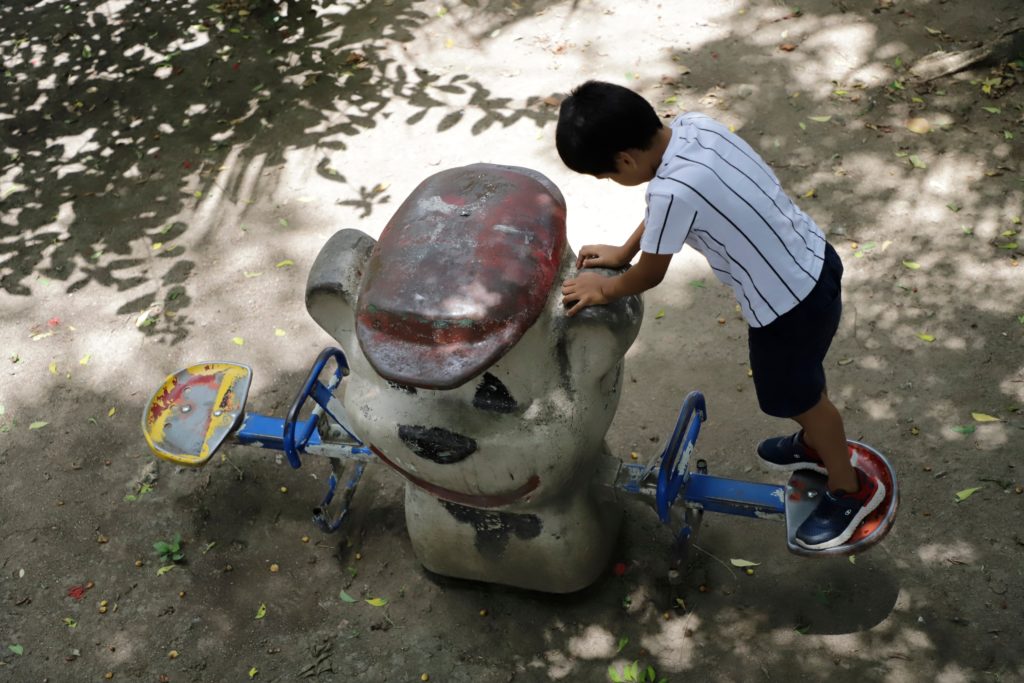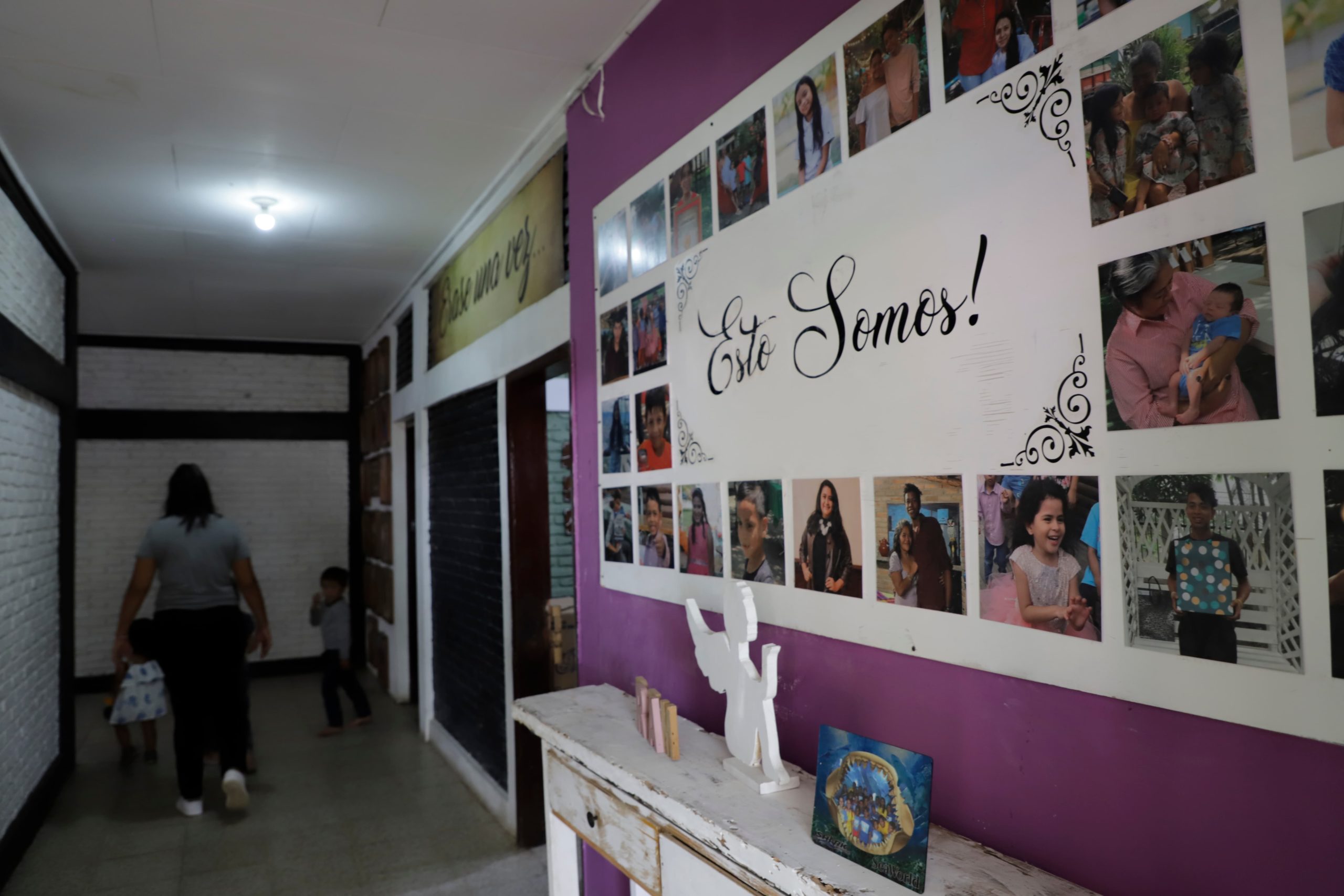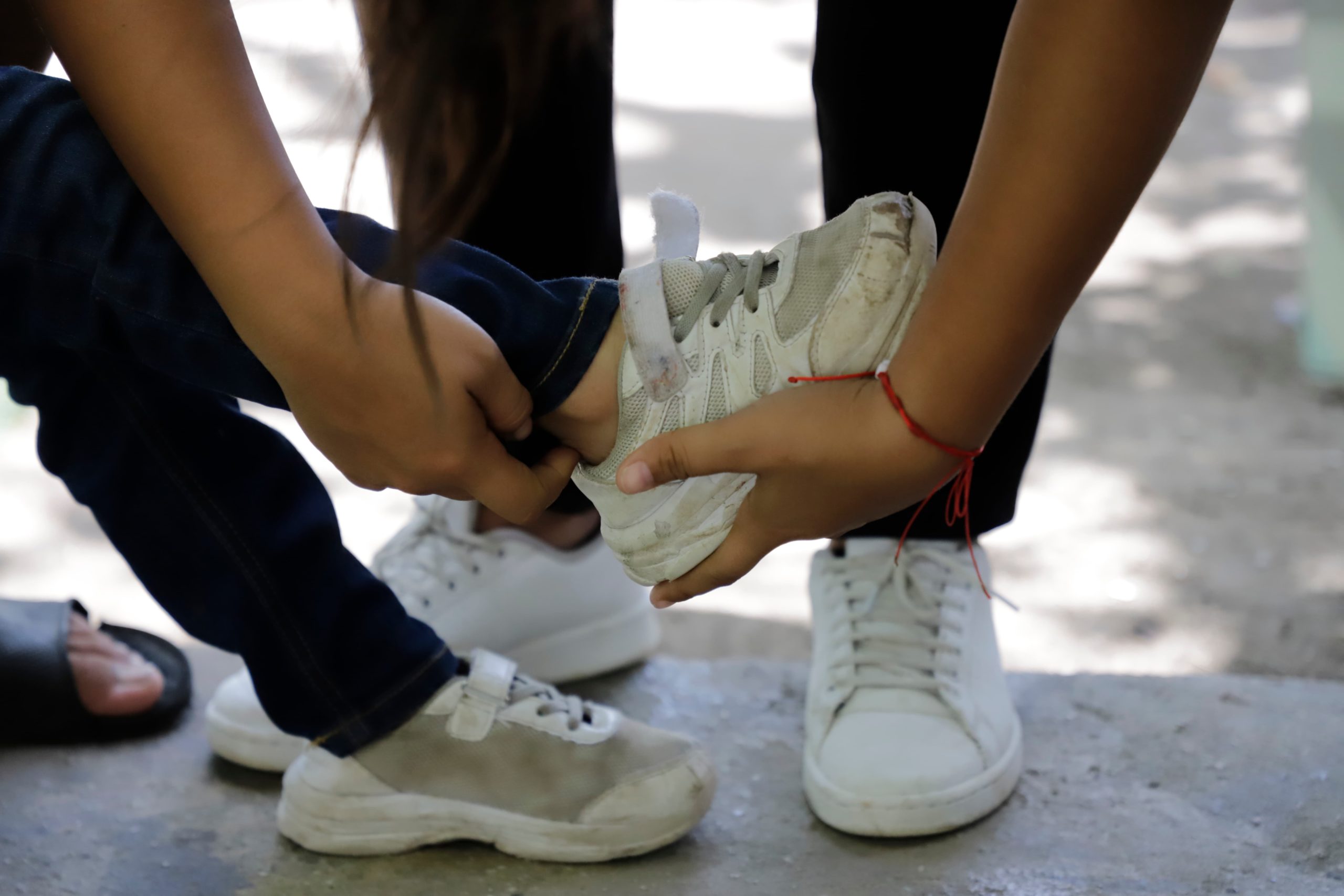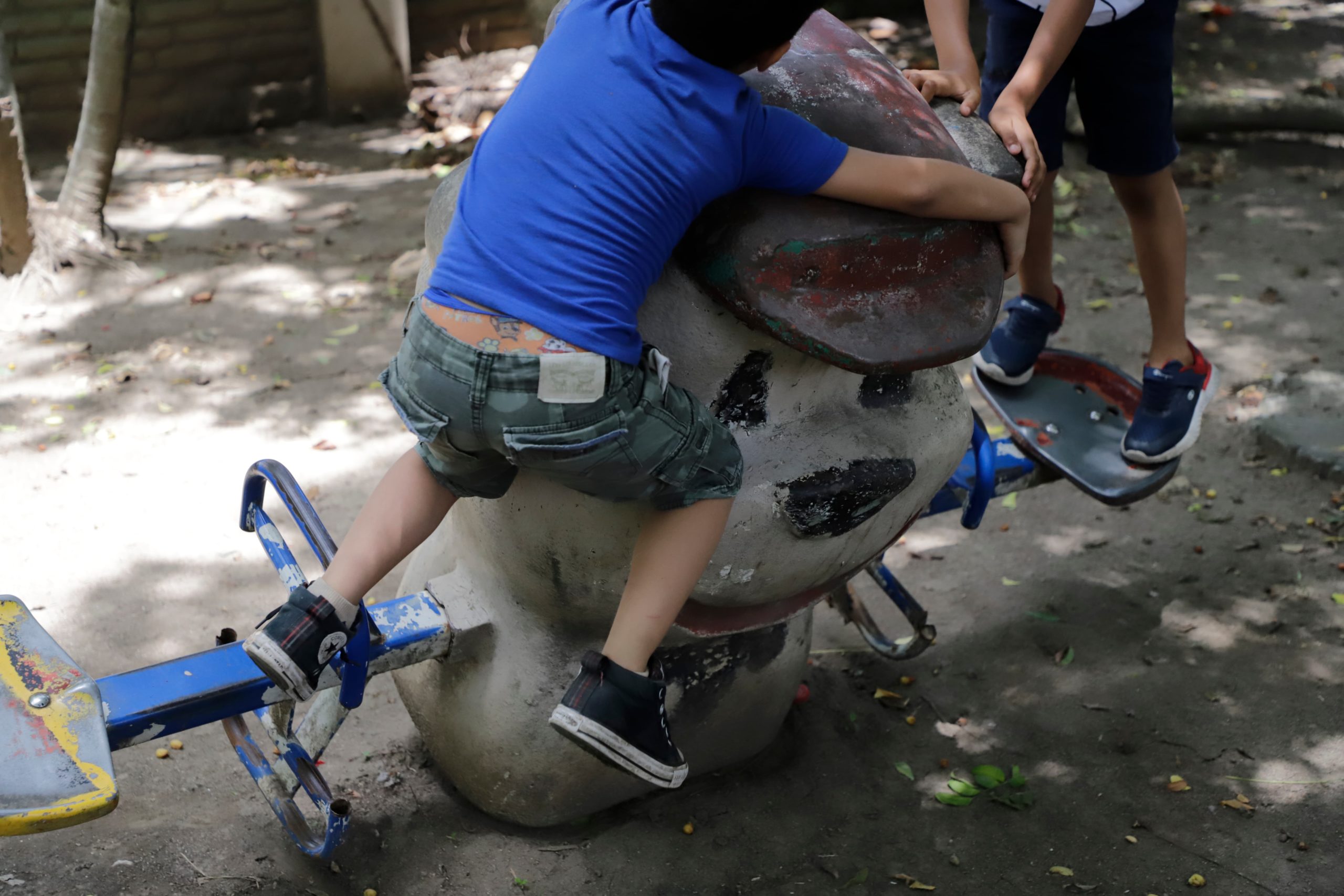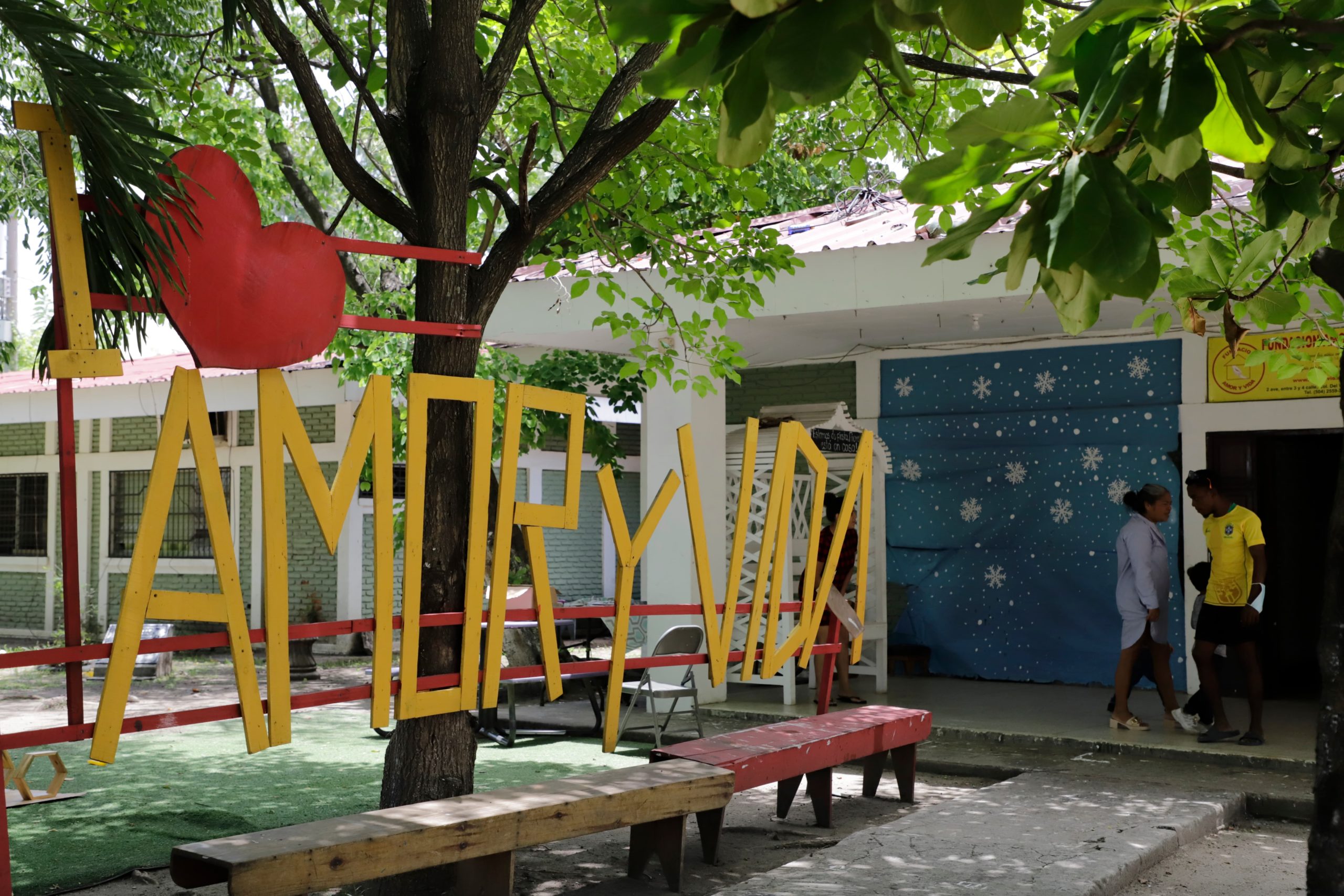The death of young Keren López at the hands of the Honduran State, who had custody of the child, shocked public opinion because this is not an isolated event in the lives of children in Honduras. Human rights activists point out that children have not been a priority.
Text: Allan Bu
Photography: Amílcar Izaguirre
Translated by: José Rivera
A few meters away from María Iris Ríos there are boys and girls playing, yelling, and running around. She’s sitting on a wooden chair and doesn’t hesitate to say: «I feel ashamed now». This feeling goes back to November 2021 when she brought together a group of young men and women, eligible to vote, who live in the center she runs. Back then, she said to them: «you know we have suffered during the last 12 years, but when she becomes president things will change». That day, she asked them to vote for Xiomara Castro.
María Iris is the director of the center “Hogar Amor y Vida” located in San Pedro Sula, in northern Honduras, where 33 children and young adults, between the ages of 5 and 22, live. For many years, she has been running the center and struggling to obtain national and international support without receiving any help from the Honduran State. Instead of providing help to the center, when the National Party was in power, agents from the Public Prosecutor’s office carried out inspections on several occasions but left disappointed.
Before the 2021 Elections, María Iris felt it was «inappropriate» to influence voters, but she did it anyway. She told them that when the National Party was in power the center was in a difficult situation and she believed in change. She also told them about the possibility of obtaining scholarships and even a visit from the then-presidential candidate to learn about the center and the struggles they are still going through. She was tired of being a director, fundraiser, psychologist and a friend. Maybe the new administration will provide new staff, «that’s what I was hoping for and they all voted for Xiomara. Now I’m ashamed knowing what I did». At the center, everyone was excited when the Libertad y Refundación Party won the 2021 Presidential Elections on November 28. «There’s a video of me dancing», Maria recalls.
The new administration did not live up to María Iris’ expectations. «No one cares about children in this country», she said as the youngest children of the center were running around. She considered that maybe children are not more vulnerable now, but during this administration things that we had not seen before have come to light.
The State, through the Institute for Infants, Adolescents, and Family (Dirección de la Niñez, Adolescencia y Familia – DINAF), has agreements with 32 charity organizations that address the different needs vulnerable children have. The State deposits funds for each child or adolescent to the center according to the service it provides. Those children who DINAF consider need protection are sent to one of these centers
One of the events María Iris says came to light was the death of young Keren (1 year old). She was taken by the State from the custody of her parents three months ago and during this time she was transferred to Mario Catarino Rivas Hospital in San Pedro Sula because she suffered from severe undernourishment. She later died in the hospital and staff told Keren’s mother there were signs of sexual abuse. The news unleashed a scandal.
After several media outlets broadcast an interview with Keren’s mother where she mentioned her baby had been abused, Forensic Medicine denied those claims, ruled out sexual abuse, and stated that the cause of death was undernourishment, the reason custody was taken from her parents three months before, but her health did not improve at Fundación Nutre Hogar, to where she was taken by staff from DINAF.
Contracorriente went to Nutre Hogar in the neighborhood of Las Colinas in Choloma, Cortés, but only found a gate without any security guards. From there nobody could be seen and there were no vehicles in the large parking lot. It seemed abandoned, but when we asked a neighbor he said: «it’s down there», and pointed to the building where we had been moments before. Private security guards in the neighborhood had already told us that the center was not talking to media outlets.
On its website, which hasn’t been updated in years, Nutre Hogar states that one of its objectives is to «contribute to reducing rates of undernourishment in children and the consequences that impede boys and girls to fully develop, which in turn interferes with the possibilities of better development for individuals and the country».
The Attorney General’s office has begun preliminary inquiries in Keren’s case. They visited facilities at DINAF in San Pedro Sula and the building where Nutre Hogar is located. Elvis Guzmán, spokesperson for the Attorney General’s office, stated that the Office for Public Accountability and Fight Against Corruption (Fiscalía Especial para la Transparencia y Combate a la Corrupción Pública – Fetccop) followed up on the child’s death. They inquired at DINAF if regular visits to monitor Keren’s health and that of other children took place. However, Guzmán said that agents «noticed something was not right» when staff couldn’t answer some questions, such as how many children are in the custody of DINAF.
As a result of these events prosecutors launched an investigation and took statements from several employees at DINAF. Prosecutors inquired at Nutre Hogar about the conditions in which Keren was admitted, her medical treatment and the respective follow-up. «In due course, the Attorney General’s office will determine if there are situations that require further investigation», Guzmán affirmed.
Although Guzmán didn’t mention if a crime was being investigated, if that were the case, the investigation would be a guarantee to bring those who are responsible to justice. According to human rights organizations, between 90 and 95 percent of crimes in Honduras go unpunished. A report by the Association For a More Just Society (Asociación para Una Sociedad Más Justa – ASJ) published in July 2023 revealed that 9 out of 10 child abuse crimes go unpunished. Ninety percent of aggressors are not held accountable.
Children
«Children come first», you often hear. It’s one of those phrases people say by mere habit. The Honduran Constitution grants this right in a chapter fully dedicated to the rights of children and there are also Child Protection Laws (Código de la Niñez). In addition, there’s the National Child Protection System (Sistema Integral de Garantía de Derechos de Niñez, Adolescencia de Honduras – Sigadenah), which is part of a coalition of public institutions that provide services to children, but data and facts show that in our country children are not a priority. The voices of some of those involved in defending the rights of vulnerable children have messages that coincide.
«The precarious situation of children in Honduras is nothing new, it’s historical», said Ricardo Coello, programme director at Casa Alianza Honduras, a charity organization that has been helping children for 26 years. Leonardo Pineda, an analyst, maintains that in Honduras «this issue is a disaster and that has been the case for a while. Children and families have never been a priority of the State».
To say that children in Honduras are not a priority is a serious matter. According to a 2022 situational analysis of children and adolescents by UNICEF, 36 percent of Hondurans are under the age of 18, approximately 3.5 million, from which 500,000 are forced to work due to poverty, data reviewed by Casa Alianza shows. «They have become underpaid workers and providers for their families and in the process they usually leave school», Coello says.
On the other hand, it’s estimated that there are 500,000 minors in the country who do not work or study. Coello says that some migrate to the United States, but others are easily recruited by gangs and organized crime. In a 2022 study carried out by Unicef, around 42 percent of young interviewees said they have plans to leave the country to find opportunities; 19,4 percent think that they will have opportunities, but don’t find them appealing and 17.8 percent would have to do any kind of work to survive. Only 11.4 percent of adolescents interviewed think they will realize their dreams.
A report published by Unicef in 2022 points out that in Honduras 42 percent of adolescents have plans to leave the country to find opportunities.
In addition, data provided by the Health Ministry shows that between 2020 and 2022, 71,622 girls and adolescents between the ages 10 to 19 gave birth. Many of these pregnancies are a result of sexual abuse. It is estimated that 7 out of 10 girls get pregnant. In view of this, President Xiomara Castro vetoed a bill that proposed sexual education in schools to prevent pregnancies, the veto was made public after mass protests by pro-life movements. The implications of an adolescent pregnancy begin with health complications but also include postponing school and assuming a responsibility without having the required physical and emotional maturity.
Casa Alianza also estimates that in our country there are between 10 and 20 thousand children roaming the streets, «these are homeless children who do all sorts of activities such as errands and recycling, but can also be recruited by organized crime», Coello said.
Coello added that for 20 years Casa Alianza has provided support to more than 800 boys and girls who were sexually abused. Another revealing and worrying fact is that Interpol’s database shows 737 Honduran minors who disappeared. Many of them are 1 or 2 year old babies. «It’s obvious that something serious is going on with children and no solution is put forward, it happens with total impunity. There’s no way to follow up on cases and this has been going on not just during the current administration but for a while now», analyst Leonardo Pineda pointed out.
In 2021 the Honduran State had custody of around 3,400 minors. They are accommodated in 119 shelters that rely on 78 Residential Alternative Care Centers (Instituciones Residenciales de Cuidado Alternativo – IRCA), previously known as shelters or charity organizations. Young Keren spent the last three months of her life in one of those shelters, she was taken from her family and died of severe undernourishment while the State had custody of her.
NGOs
In 2014, during Juan Orlando Hernández’ first presidential term, the government decided to close shelters that help children and are dependent on the State. That work is now outsourced to the now well-known IRCA facilities, whose funding is channeled through the Ministry of Interior (Ministerio de Gobernación), but that work is or should be supervised by DINAF. Some people claim that the government has control of registered IRCAs. «Anyone can run a shelter because many children need help and the State no longer takes care of them, they shifted that responsibility to NGOs», Suyapa Sabillón, a lawyer who has been working with children for over 20 years, said to Contracorriente.
In 2021 DINAF identified 119 existing IRCAs, but Sabillón maintains that there are almost 3,000 from which only 200 are operating.
But we requested information to DINAF and they confirmed that around 165 IRCAs currently take care of children and adolescents between ages 0 and 18. At these centers, they address different needs children have: transit homes, residential care homes, disability services and temporary protection for immigrant children and adolescents as well as their families. According to data they provided, there are around 7,000 children and adolescents in these centers.
One of the questions we asked DINAF was how much money NGOs receive to provide care for children and how many centers are managed by the State and their exact response was: «In June 2023, 32 agreements to outsource care services to 25 organizations were signed. These services include special protection, transit homes, residential alternative care centers, families under temporary protection, and immigrant children and adolescents. Only those organizations that have an agreement with DINAF receive funding from the State, the amount varies according to the number of children and adolescents and the type of care they provide».
DINAF explained that although not all shelters receive State funding, all of those providing care for children and adolescents are under State supervision. On the list of 32 residential alternative care centers that have an agreement with the State, Nutre Hogar is not found and Hogar y Esperanza is the only registered shelter from northern Honduras. The government hands out between 5,000 and 11,000 lempiras (200-450 dollars) according to the service provided by the center. This year, centers that have an agreement with the government will receive 74,904 lempiras.
Xiomara Castro’s administration has pushed for a form of personalized care called «Madres Solidarias» funded by the State and monitored by DINAF’s regional offices. The amount of financial support mothers receive depends on the children’s health and age. DINAF informed that 77 mothers are currently receiving financial support. Contracorriente contacted the regional office for an interview, but they didn’t reply.
To know more about how these centers operate Contracorriente requested an interview to Obras Sociales Vicentinas, Hogar Emanuel, Hogar San José and Hogar Esperanza, but none accepted our request. One of the centers asked that we first send an email but they didn’t respond; another center forwarded the request to the board of directors but never replied and at another center they said the director was absent and she is the only person who could authorize a visit or an interview.
María Iris affirms there are many NGOs «that have an agreement with the government and receive funding». She recalls that during Juan Orlando Hernández’ second presidential term staff from DINAF went to certify the center. They offered her a salary of 150 thousand lempiras which she turned down and asked instead that they give that money to provide care for children, but they didn’t come back. «They need to bribe people who are taking care of children and if something happens (like Keren’s case) it’s better if they remain quiet», María said. It’s important to say that the State has the obligation to support centers that have the custody of children, but these funds should be audited and not tied to any conditions.
In the case of Hogar Amor y Vida, María Iris says that the center can continue operating with 150 lempiras per month to hire more staff since the center receives a lot of support from abroad. But at the moment the fact is that «we don’t get any support from the government, just criticism».
Ricardo Coello told us that Casa Alianza is currently working with children from areas with high rates of violence, but is still managing a mixed center that helps 70 minors, many of them displaced by violence. He also manages a center that currently provides support to 18 victims of sexual abuse and human trafficking. Funding mostly comes from international cooperation, especially from Germany, Switzerland and the United States. They carry out specific projects with the government, but funding is not permanent.
Do children matter?
«Nobody cares about children, not just those who have HIV, nobody cares about children in this country and we won’t make any progress if we don’t protect them», said María Iris Ríos, director at Hogar Amor y Vida.
«Why do I have to look for international support if it’s the government’s responsibility?», she asked angrily and demanded that the government for which she voted be ousted «because they don’t care about children». She added that there are many people who are not interested in this issue. At that moment, media outlets replied to the denunciation on behalf of Keren’s mother regarding the alleged abuse which was later dismissed by Forensic Medicine, but María said with a sense of anticipation: «The results won’t be favorable because Keren was the daughter of a poor woman and the government will not take responsibility for such horror».
María Iris thinks similar situations will come to light, «all of the bad things surrounding children» and makes a very risky statement: «The worst thing that could happen to a child in this country is to fall into the hands of the government».
“Lo peor que le puede pasar a un niño de este país en caer en manos del Gobierno”, María Iris Ríos, directora de Hogar Amor y Vida.“The worst thing that could happen to a child in this country is to fall into the hands of the government”, María Iris Ríos, director at Hogar Amor y Vida
Gloria Milian, lawyer and former city councilor at the mayor’s office for the Liberal Party in San Pedro Sula, led efforts to demand justice for children who are victims of sexual abuse. It was Keren’s case that motivated that demand. I regret that in the cases of children like Keren, their parents, grandparents, uncles and their whole families failed them, but the State failed them too because its highest purpose is to protect citizens and those who do not have a voice.
I regard the DINAF as a “white elephant”, an expression used to describe ineffective institutions. She says that those who run the institution have been hiring a bunch of activists, but are they up to the task? “That doesn’t seem to be the case because there’s a lot going on and it’s not news, the problem is that it hasn’t been denounced”.
Just like María Iris Ríos, Gloria thinks we should speak up. She saw protests in favor of supposedly protecting the family and against sexual education in schools, but who’s protesting for children like Keren? She added that there are children whose rights are violated from birth because mothers don’t get prompt medical attention and «give birth on the sidewalks».
Leonardo Pineda agreed that the government has basically turned DINAF into a political and not technical entity, as it should be. «We all know about the embarrassing recordings from Dulce Villanueva released to the public stating that work done at DINAF doesn’t matter, what matters is politics and that’s how it was handled. Hiring activists was the priority and not taking care of children and that’s why she lost her job as director».
Dulce Villanueva, former director at DINAF, quit when audio recordings were leaked in which she allegedly asked for money in exchange for employment or higher salaries, and that’s not right, but this behavior is deeply rooted in this country. The worst part was an audio of Villanueva saying that she doesn’t care if DINAF is doing its job or not and what matters is politics.
Lorena Cálix, spokesperson for the Public Prosecutor’s office in Tegucigalpa, said to Contracorriente that the Office for the Protection of Children (Fiscalía Especial de Protección a la Niñez – FEP-NIÑEZ) launched an investigation in response to «complaints brought forward by individuals concerning personal irregular situations that took place at DINAF while Dulce María was director».
She added that Fetccop launched an investigation proprio motu regarding the leaked audio recordings in which Villanueva allegedly granted contracts of employment at DINAF in exchange for bribes, «there aren’t any other open investigations and so far no one has been criminally charged and no summons has been issued because complaints are still under investigation».
Ricardo Coello from Casa Alianza is worried about the generation of working adults Honduras will have in 10 or 15 years since there is a lack of vision for the present and the future and these children will be in charge of making political, economic, and social decisions in the country, «what do we make out of the future? It looks grim». He thinks children have not been a priority and maybe they’re part of the agenda of policy makers, but the vision toward boys and girls has not changed. «There’s a degree of good will, there are good policies, but children haven’t received the attention they deserve».

